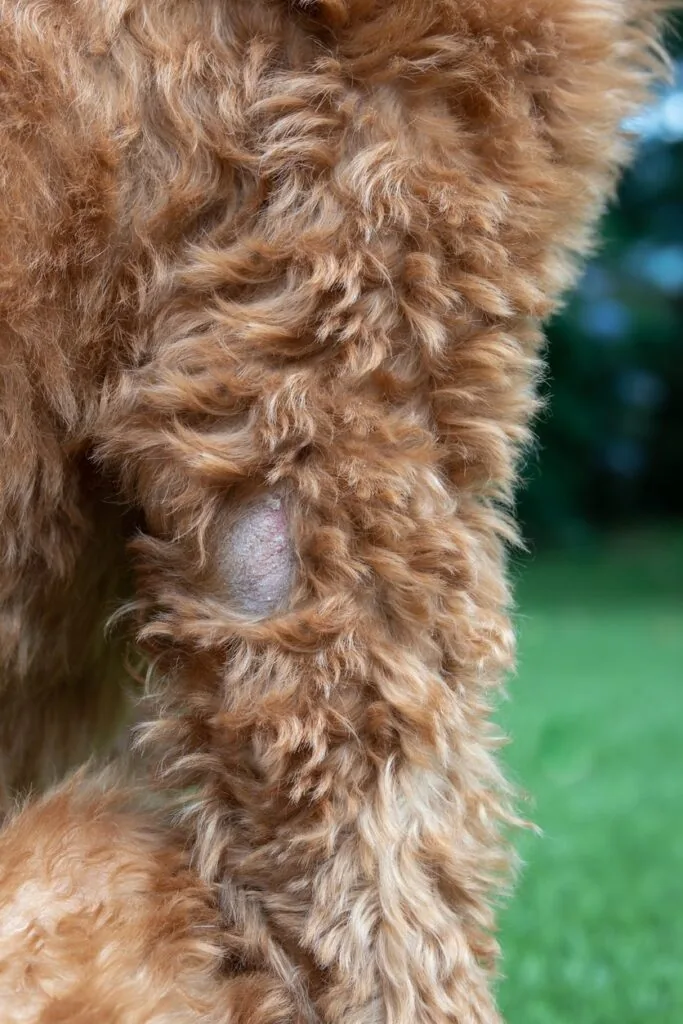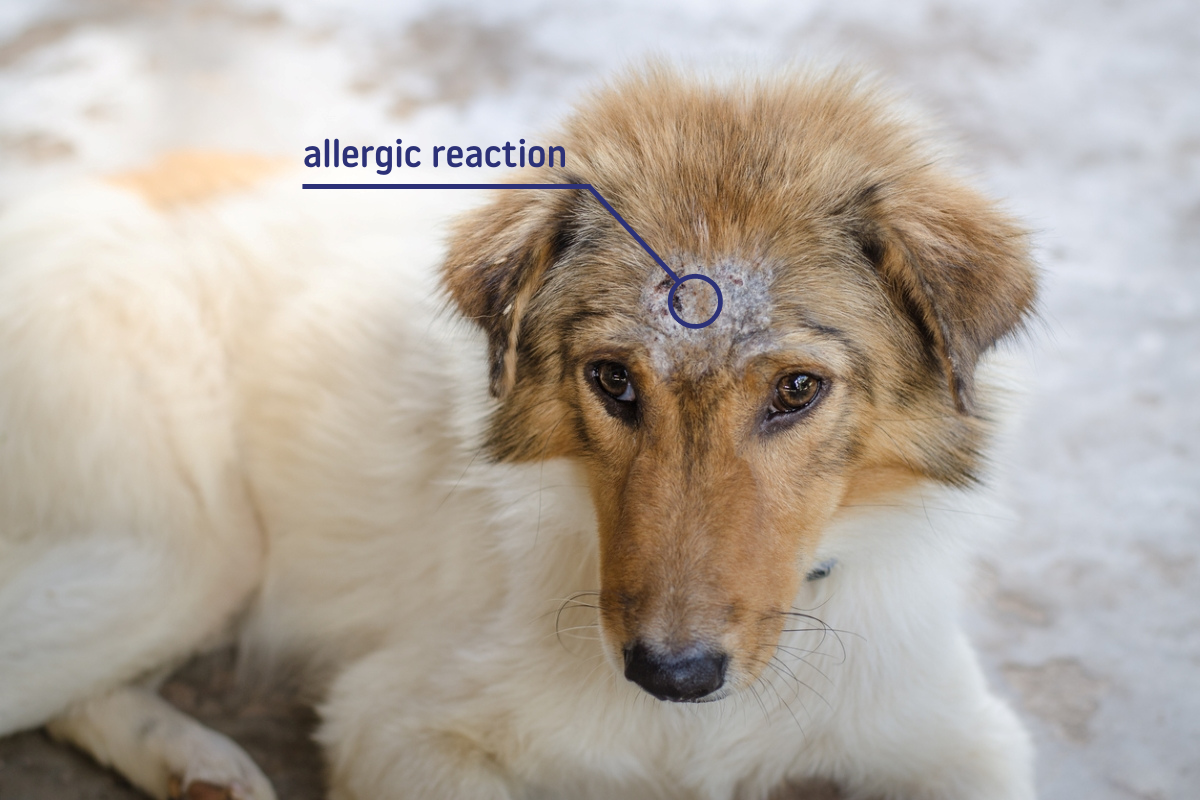Dry skin in dogs can result from allergies, poor diet, or environmental factors. It might also indicate underlying health issues.
Dogs often suffer from dry skin, which can cause discomfort and itching. Common causes include allergies, which can stem from food, pollen, or fleas. Environmental factors like dry air or harsh shampoos can also strip natural oils from their skin.
Poor nutrition may lead to skin problems as well, indicating the need for a balanced diet. In some cases, dry skin could signal an underlying health issue, such as hypothyroidism or infections. Regular vet check-ups are essential to diagnose and treat the root cause effectively. Proper care and attention to your dog’s diet and environment can help maintain healthy skin.
Common Causes
Does your dog have dry, flaky skin? Understanding the common causes can help. Identifying the root cause is the first step to relief.
Environmental factors play a significant role in your dog’s skin health. Dry air can remove moisture from their skin. Cold weather can also be harsh. Frequent baths with harsh shampoos strip natural oils. Dust and pollen can irritate their skin.
Nutritional Deficiencies
Proper nutrition is vital for healthy skin. A lack of essential fatty acids can cause dryness. Omega-3 and Omega-6 fatty acids are crucial. Ensure your dog’s diet includes these nutrients. Protein deficiency can also affect skin health.
Allergies
Allergies are a common cause of dry skin in dogs. Dogs can be allergic to food, pollen, or even dust. Common food allergens include beef, chicken, and dairy. Seasonal allergies can flare up during certain times of the year. Look out for itching, redness, and dry patches.

Credit: www.barkandwhiskers.com
Symptoms To Watch For
Dry skin in dogs can be uncomfortable and bothersome. Recognizing the symptoms early can help you address the problem before it worsens. Below are some common symptoms that indicate your dog may have dry skin.
Flaky Skin
Flaky skin is a clear sign of dryness. You might notice dandruff-like flakes on your dog’s coat. These flakes can be white or yellowish. They often appear around the neck and back. Regular grooming can help you spot this symptom early.
Itching And Scratching
Constant itching and scratching can be a telltale sign. Dogs with dry skin often scratch more than usual. They may chew or lick their paws and other areas. This behavior can lead to further skin damage and infections.
Redness And Irritation
Redness and irritation are common in dogs with dry skin. The skin may look inflamed or swollen. Red patches can appear in various areas, such as the belly and ears. Irritation can cause your dog to feel uncomfortable and restless.
| Symptom | Description |
|---|---|
| Flaky Skin | White or yellowish flakes on the coat. |
| Itching and Scratching | Frequent scratching and chewing of skin. |
| Redness and Irritation | Inflamed or swollen patches of skin. |
Identifying these symptoms can help you take action. Consult your vet if you notice any of these signs. Your dog’s comfort and health are important.
Environmental Factors
Environmental factors play a significant role in your dog’s skin health. These factors can contribute to dry, flaky skin. Understanding these can help you manage your dog’s skin condition better.
Weather Conditions
Weather changes can affect your dog’s skin. Cold weather can dry out the skin. Hot weather can cause dehydration. Keep your dog hydrated and use a humidifier during cold months. This helps maintain skin moisture.
Indoor Heating
Indoor heating can lead to dry skin. Heaters reduce humidity levels, making the air dry. Dry air can strip your dog’s skin of natural oils. Place water bowls around the house to increase humidity. You can also use a humidifier to add moisture to the air.
Frequent Bathing
Frequent bathing can remove natural oils from your dog’s skin. This can cause dryness and irritation. Use dog-friendly shampoos and avoid hot water. Limit baths to once a month unless necessary. This helps retain natural skin oils.
| Environmental Factor | Impact on Skin | Solution |
|---|---|---|
| Weather Conditions | Causes dehydration and dryness | Hydrate and use a humidifier |
| Indoor Heating | Reduces humidity, dries out skin | Increase humidity with water bowls or humidifier |
| Frequent Bathing | Removes natural skin oils | Use dog-friendly shampoos, limit bathing |
Nutritional Factors
Dry skin in dogs can stem from several nutritional factors. These factors play a significant role in maintaining healthy skin. Let’s explore the different aspects:
Inadequate Diet
An inadequate diet can lead to dry skin in dogs. Dogs need a balanced diet with essential nutrients. Foods lacking in vitamins and minerals can cause skin issues. A diet poor in protein, for example, can affect skin health.
Essential Fatty Acids
Essential fatty acids are crucial for skin health. Omega-3 and Omega-6 fatty acids are key. These acids help maintain skin moisture. A deficiency in these can lead to dry, flaky skin.
- Omega-3 sources: Fish oil, flaxseed oil
- Omega-6 sources: Chicken fat, sunflower oil
Hydration
Proper hydration is vital for a dog’s skin. Dogs need plenty of water daily. Dehydration can cause dry skin. Ensure your dog has access to fresh water at all times.
Allergies And Sensitivities
Understanding the causes of your dog’s dry skin is crucial. Allergies and sensitivities are common culprits. These can manifest in various forms, leading to discomfort and irritation for your furry friend.
Food Allergies
Dogs can develop food allergies at any age. Common allergens include beef, chicken, dairy, and grains. Symptoms may include dry skin, itching, and gastrointestinal issues.
- Beef
- Chicken
- Dairy
- Grains
Switching to a hypoallergenic diet can help. Consult your vet for the best options.
Environmental Allergens
Environmental factors like pollen, dust mites, and mold can cause dry skin. Dogs exposed to these allergens may suffer from itching and redness.
| Allergen | Symptoms |
|---|---|
| Pollen | Itching, Redness |
| Dust Mites | Dry Skin, Sneezing |
| Mold | Rashes, Itching |
Keep your home clean and use air purifiers to reduce allergens.
Flea Allergies
Fleas are tiny but cause significant problems. Flea bites can lead to flea allergy dermatitis (FAD), causing severe itching and dry skin.
- Use flea prevention products regularly.
- Vacuum your home often.
- Wash your pet’s bedding weekly.
Early treatment can prevent complications.

Credit: www.doglyness.com
Medical Conditions
Dry skin in dogs can be caused by various medical conditions. Understanding these conditions can help you take better care of your furry friend. Below are some common medical reasons for dry skin in dogs.
Hypothyroidism
Hypothyroidism occurs when the thyroid gland does not produce enough hormones. This condition can cause your dog’s skin to become dry and flaky. Other symptoms include:
- Weight gain
- Lethargy
- Hair loss
- Cold intolerance
If you notice these signs, consult your vet. A blood test can confirm hypothyroidism. Treatment usually involves daily medication.
Cushing’s Disease
Cushing’s disease is caused by an overproduction of cortisol. This condition can lead to dry skin. Symptoms of Cushing’s disease include:
- Increased thirst
- Frequent urination
- Abdominal swelling
- Hair loss
If your dog shows these symptoms, a vet visit is needed. Diagnosis involves blood tests and possibly an ultrasound. Treatment options vary from medication to surgery.
Skin Infections
Skin infections can also cause dry skin in dogs. These infections can be bacterial, fungal, or parasitic. Common signs of skin infections include:
- Redness
- Swelling
- Itching
- Discharge
Skin infections need prompt veterinary care. Treatment may include antibiotics, antifungal medications, or parasite control.
Preventive Measures
Dry skin in dogs can be bothersome for both pets and owners. Preventive measures help maintain your dog’s skin health. Below are some key strategies to prevent dry skin.
Proper Diet
A balanced diet is crucial for healthy skin. Ensure your dog gets enough omega-3 and omega-6 fatty acids. These nutrients help keep the skin moisturized.
Include foods rich in vitamins and minerals. These boost your dog’s overall health. Consult your vet for the best diet plan.
Regular Grooming
Regular grooming keeps your dog’s skin and coat healthy. Brush your dog’s fur often. This helps remove dead skin cells and stimulates blood flow.
Check for parasites like fleas and ticks. These pests can cause dry skin.
Use a soft brush to avoid irritating the skin. Aim for at least one grooming session per week.
Moisturizing Shampoos
Choose the right shampoo for your dog. Use moisturizing shampoos designed for dogs with dry skin.
Avoid shampoos with harsh chemicals. These can strip natural oils from the skin.
Bathe your dog only when necessary. Over-bathing can lead to dry skin.
Look for shampoos with oatmeal or aloe vera. These ingredients soothe and hydrate the skin.
| Preventive Measure | Action | Benefit |
|---|---|---|
| Proper Diet | Include omega-3, omega-6, vitamins | Moisturizes skin |
| Regular Grooming | Brush weekly, check for parasites | Removes dead skin, stimulates blood flow |
| Moisturizing Shampoos | Use gentle, hydrating shampoos | Soothes, hydrates skin |
Treatment Options
Dry skin in dogs can be uncomfortable for your furry friend. Understanding the treatment options is essential to help alleviate their discomfort and promote healthy skin. Below are some effective treatments to consider.
Veterinary Care
A visit to the veterinarian is crucial. A vet can diagnose the root cause of your dog’s dry skin. The vet may perform skin tests and blood work. This helps in identifying any underlying medical issues.
Based on the diagnosis, the vet will recommend appropriate treatments. These might include dietary changes or specific medications. Regular check-ups ensure your dog’s skin stays healthy.
Medications
Medications can help treat dry skin in dogs. Your vet may prescribe topical treatments or oral medications. These medications target infections, allergies, or other skin conditions.
- Antibiotics: Used for bacterial infections.
- Antifungal treatments: Effective against fungal infections.
- Antihistamines: Help with allergic reactions.
- Omega-3 supplements: Improve skin health and reduce inflammation.
Always follow your vet’s instructions when administering medications. This ensures the best outcome for your dog.
Home Remedies
Several home remedies can help alleviate dry skin in dogs. These remedies are easy and cost-effective.
- Regular Bathing: Use a gentle, hypoallergenic shampoo.
- Moisturizing: Apply coconut oil or olive oil to dry areas.
- Humidifiers: Use a humidifier to add moisture to the air.
- Balanced Diet: Ensure your dog eats a nutritious diet.
These home remedies can complement veterinary care and medications. They provide additional relief and help maintain skin health.
When To Seek Help
Dry skin in dogs can be a common issue, but sometimes it needs professional attention. Recognizing the signs early can prevent further complications. Below are key indicators that it might be time to consult your vet.
Persistent Symptoms
If your dog’s dry skin does not improve with basic care, seek help. Persistent symptoms include:
- Flaky skin
- Redness
- Constant scratching
These signs could indicate a more serious issue.
Secondary Infections
Secondary infections can occur if dry skin is not treated. Symptoms include:
- Pus-filled sores
- Swelling
- Odor
These infections need immediate medical attention.
Behavioral Changes
Behavioral changes can also signal the need for help. Look for:
- Lethargy
- Loss of appetite
- Excessive licking
These changes can indicate discomfort or pain.
| Symptom | When to Seek Help |
|---|---|
| Flaky skin | If it persists |
| Redness | Immediate attention |
| Pus-filled sores | Immediate attention |
| Lethargy | When observed |

Credit: westloopvet.com
Frequently Asked Questions
Why Does My Dog Have Dry Skin?
Dry skin in dogs can be caused by allergies, poor diet, or environmental factors. Ensure your dog has a balanced diet and proper grooming. If the problem persists, consult a vet.
How Can I Treat My Dog’s Dry Skin?
To treat dry skin, use moisturizing shampoos and provide omega-3 supplements. Regular grooming and a balanced diet also help. If symptoms persist, consult your vet.
Can Dog Food Cause Dry Skin?
Yes, poor-quality dog food can cause dry skin. Ensure your dog’s diet includes essential fatty acids and nutrients. High-quality food can improve skin health.
Is Dry Skin In Dogs A Serious Issue?
Dry skin can indicate underlying issues like allergies or infections. While not always serious, it should be addressed to ensure your dog’s comfort and health.
Conclusion
Understanding why your dog has dry skin is crucial. It helps in providing the right care and treatment. Regular check-ups, proper diet, and hydration can prevent dry skin. Consult your vet for personalized advice. A happy, healthy dog starts with good skin care practices.
Keep your furry friend comfortable and itch-free.








